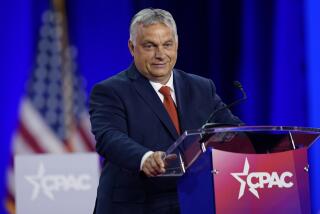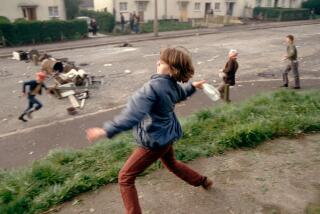Obama cites peace in Northern Ireland, alluding to Middle East
Reporting from Dublin, Ireland — Lauding the ability of former warring sides to “reimagine their relationships,” President Obama paid tribute to the Northern Ireland peace process during a visit to this once-troubled island, a thinly veiled allusion to the possibility that peace is attainable even in such unlikely places as the Middle East.
Obama did not mention the Israeli-Palestinian conflict by name during remarks after landing in Dublin, the capital of the Republic of Ireland. But he cited the greatly diminished sectarian violence in the British province of Northern Ireland — since the 1998 Good Friday agreement was signed under American guidance — as a beacon to others caught in seemingly intractable conflicts.
“It sends what Bobby Kennedy once called ‘a ripple of hope’ that may manifest itself in a whole range of ways,” Obama said, standing with Irish Prime Minister Enda Kenny at the beginning of a four-nation European visit. “We are proud of the part that America played in helping to get both sides to talk and to provide a space for that conversation to take place.”
Photos: A snapshot of Obama’s visit to Ireland
The remarks resonated because of Obama’s push to restart peace talks between Palestinians and Israelis. Seeking to harness the opportunities created by the upheaval across the Middle East, Obama last week proposed principles for resuming talks, attempting to show that negotiations have not reached a dead end.
That message has become increasingly urgent because of a Palestinian drive for statehood that is gathering global momentum ahead of a possible United Nations vote on the issue in September. The Obama administration is anxious to defuse support for such a vote, fearing it will embarrass Israel and close the door to the Jewish state’s willingness to negotiate.
The lack of results from the stalled peace process has produced widespread exasperation in Europe, where the Palestinian cause has strong popular support and several leaders have suggested they could endorse a declaration of statehood at the U.N. in the absence of progress in negotiations.
Obama’s optimistic tone sought to impress Europeans that history’s currents can bend in ways that might once have seemed unthinkable. The Irish “inspired the entire world by choosing to see past the scars of violence and mistrust,” Obama said late in the day during a boisterous open-air speech before an ecstatic crowd of thousands in Dublin’s College Green, who roared at his message of “Yes, we can,” delivered in Gaelic.
His point was buttressed by the fact that he was following Britain’s Queen Elizabeth II onto Irish soil. Just last week, the queen was, for the most part, warmly greeted during the first official visit to the Republic of Ireland by a British monarch in more than a century, a symbolic attempt to heal centuries of enmity and violence between the colonized and colonizer.
The Irish had no hesitation embracing Obama, who seemed to get a great kick out of playing up his Irish roots. His brief visit to Ireland included dropping in by helicopter to Moneygall, a normally unassuming village of 300 or so that on this day basked in its claim to having been the home of Obama’s great-great-great-grandfather.
The president and first lady visited a pub where Obama deeply inhaled his swallows from a pint of Guinness, as crowds pressed around. “You look a little like my grandfather,” the president said to one man at the bar.
The feel-good vibe should last for another day at least, with Obama having pushed on to London earlier than planned because of fears that ash from a spewing volcano in Iceland might choke local airspace. In the British capital, Obama is expected to receive sympathetic treatment from Conservative Prime Minister David Cameron, who is keen to play up what has for generations been seen from London as a “special relationship.”
In a meeting with a small group of American reporters at the prime minister’s residence at Downing Street on Monday, Cameron said the two governments share an “incredible alignment of views” on issues ranging from the wars in Afghanistan and Libya to the unrest in the Middle East. Senior British government officials deny any rift with the U.S. over Libya, where British and French troops are carrying the weight of the military operation, with American troops in a supporting role.
There have been differences, however, in the two governments’ approach to the aftermath of the 2008 economic crisis. Cameron’s government has moved faster and more specifically to make deep cuts to public spending than the Obama administration has.
Some of those cuts have targeted Britain’s defense spending, and there have been reports of U.S. concern that British capabilities will suffer. British officials dismiss those worries.
Obama and Cameron are having “an ongoing conversation” about the Libyan campaign, said Liz Sherwood-Randall, Obama’s senior director for European affairs. The two leaders are working to “make the most of this time to show [Moammar] Kadafi that time is not on his side.”
Photos: A snapshot of Obama’s visit to Ireland
Times staff writer Henry Chu in London contributed to this report.
More to Read
Sign up for Essential California
The most important California stories and recommendations in your inbox every morning.
You may occasionally receive promotional content from the Los Angeles Times.











